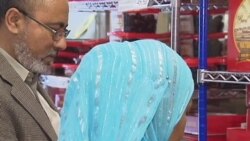WASHINGTON —
The Muslim holy month of Ramadan begins Tuesday and Muslim-Americans of diverse backgrounds and national origins will be gathering in Islamic centers across the United States to worship and celebrate their faith.
Muslims around the world observe Ramadan with a set of traditional rituals. Families shop at Halal meat stores, prepare Iftar meals to break their dawn-to-dusk fasts with family and friends, pray together and help the poor.
For Muslim-American groups, Ramadan has served as an occasion to educate the American public about the religious observance and the Islamic faith in general. The educational events include holding open houses at local mosques and Islamic centers, public lectures on Ramadan, interfaith Iftars dinners and TV ads reminding all Americans that Muslims are an integral part of U.S. society.
"We try to make people feel like they are in any Muslim country and Muslim community,” said Imam Abdulla Khouj, president of the Islamic Center in Washington D.C. “We offer the meal to break their fast. We have more than 600 people, males and females, their children, and families. They break their fast and pray with us.”
After the Iftar meal, Muslim families perform the nightly prayer. Ali Gamay, a Muslim American businessman, explains:
"Ramadan nightly prayer is an expression of devotion and seeking forgiveness. Each night we finish reciting one chapter of the holy Koran. By the end of the holy month of Ramadan, we have completed the, 30 chapters of the holy book," Gamay said.
Presidential Ramadan greetings
Since the early 1990s, U.S. presidents have issued Ramadan greetings each year to the more 1.2 billion Muslims worldwide.
Imam Khouj believes the presidential greetings have helped to raise awareness among Americans about Ramadan.
"The president of a great country acknowledges the fact that people are fasting and somehow shares with them their feelings, and at the same time makes them feel that they are welcomed in this country," said Khouj.
Nihad Awad, the executive director of the Washington-based Council on American-Islamic Relations says, "The Council on American Islamic Relations sends out information relating to Ramadan to our non-Muslim constituency and friends as well as we organize programs in which we speak about Ramadan.”
Special programs for Muslim-Americans also are held in Dearborn, Michigan, where many Muslims have made their homes in recent decades. Imam Hassan Qazwini leads the Islamic Center of America in Dearborn.
"For the English-speaking part of our congregation, we will have a special program because we believe they will be the ambassadors of Islam to non-Muslims, therefore there will be a very specialized program designed for the youth to expand their knowledge about Islam." Qazwini said. “During Ramadan, the young people here - like their parents - help the poor, whether Muslim or not.”
Qazwini said as many as 1,000 people attend evening prayers at Dearborn’s Islamic Center of America each day during Ramadan.
Muslims around the world observe Ramadan with a set of traditional rituals. Families shop at Halal meat stores, prepare Iftar meals to break their dawn-to-dusk fasts with family and friends, pray together and help the poor.
For Muslim-American groups, Ramadan has served as an occasion to educate the American public about the religious observance and the Islamic faith in general. The educational events include holding open houses at local mosques and Islamic centers, public lectures on Ramadan, interfaith Iftars dinners and TV ads reminding all Americans that Muslims are an integral part of U.S. society.
"We try to make people feel like they are in any Muslim country and Muslim community,” said Imam Abdulla Khouj, president of the Islamic Center in Washington D.C. “We offer the meal to break their fast. We have more than 600 people, males and females, their children, and families. They break their fast and pray with us.”
After the Iftar meal, Muslim families perform the nightly prayer. Ali Gamay, a Muslim American businessman, explains:
"Ramadan nightly prayer is an expression of devotion and seeking forgiveness. Each night we finish reciting one chapter of the holy Koran. By the end of the holy month of Ramadan, we have completed the, 30 chapters of the holy book," Gamay said.
Presidential Ramadan greetings
Since the early 1990s, U.S. presidents have issued Ramadan greetings each year to the more 1.2 billion Muslims worldwide.
Imam Khouj believes the presidential greetings have helped to raise awareness among Americans about Ramadan.
"The president of a great country acknowledges the fact that people are fasting and somehow shares with them their feelings, and at the same time makes them feel that they are welcomed in this country," said Khouj.
Nihad Awad, the executive director of the Washington-based Council on American-Islamic Relations says, "The Council on American Islamic Relations sends out information relating to Ramadan to our non-Muslim constituency and friends as well as we organize programs in which we speak about Ramadan.”
Special programs for Muslim-Americans also are held in Dearborn, Michigan, where many Muslims have made their homes in recent decades. Imam Hassan Qazwini leads the Islamic Center of America in Dearborn.
"For the English-speaking part of our congregation, we will have a special program because we believe they will be the ambassadors of Islam to non-Muslims, therefore there will be a very specialized program designed for the youth to expand their knowledge about Islam." Qazwini said. “During Ramadan, the young people here - like their parents - help the poor, whether Muslim or not.”
Qazwini said as many as 1,000 people attend evening prayers at Dearborn’s Islamic Center of America each day during Ramadan.





